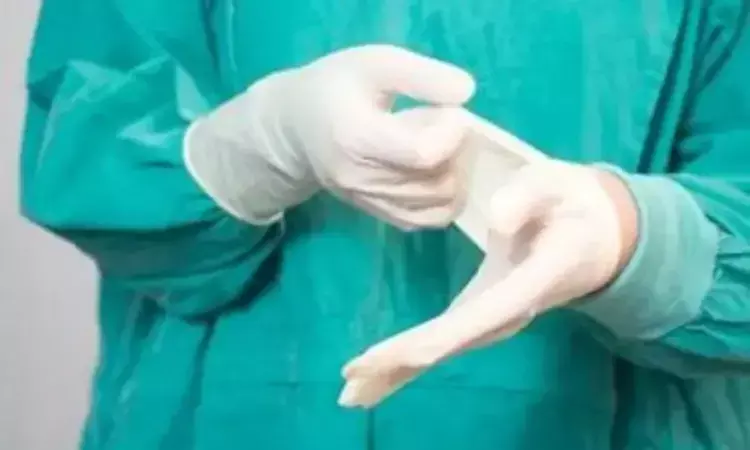- Home
- Medical news & Guidelines
- Anesthesiology
- Cardiology and CTVS
- Critical Care
- Dentistry
- Dermatology
- Diabetes and Endocrinology
- ENT
- Gastroenterology
- Medicine
- Nephrology
- Neurology
- Obstretics-Gynaecology
- Oncology
- Ophthalmology
- Orthopaedics
- Pediatrics-Neonatology
- Psychiatry
- Pulmonology
- Radiology
- Surgery
- Urology
- Laboratory Medicine
- Diet
- Nursing
- Paramedical
- Physiotherapy
- Health news
- Fact Check
- Bone Health Fact Check
- Brain Health Fact Check
- Cancer Related Fact Check
- Child Care Fact Check
- Dental and oral health fact check
- Diabetes and metabolic health fact check
- Diet and Nutrition Fact Check
- Eye and ENT Care Fact Check
- Fitness fact check
- Gut health fact check
- Heart health fact check
- Kidney health fact check
- Medical education fact check
- Men's health fact check
- Respiratory fact check
- Skin and hair care fact check
- Vaccine and Immunization fact check
- Women's health fact check
- AYUSH
- State News
- Andaman and Nicobar Islands
- Andhra Pradesh
- Arunachal Pradesh
- Assam
- Bihar
- Chandigarh
- Chattisgarh
- Dadra and Nagar Haveli
- Daman and Diu
- Delhi
- Goa
- Gujarat
- Haryana
- Himachal Pradesh
- Jammu & Kashmir
- Jharkhand
- Karnataka
- Kerala
- Ladakh
- Lakshadweep
- Madhya Pradesh
- Maharashtra
- Manipur
- Meghalaya
- Mizoram
- Nagaland
- Odisha
- Puducherry
- Punjab
- Rajasthan
- Sikkim
- Tamil Nadu
- Telangana
- Tripura
- Uttar Pradesh
- Uttrakhand
- West Bengal
- Medical Education
- Industry
Does intraoperative wound irrigation prevent surgical site infection after laparotomy? Study sheds light

Germany: A randomized clinical trial suggests that intraoperative wound irrigation with polyhexanide solution should not be recommended as standard clinical practice in open clean-contaminated surgical procedures in patients undergoing laparotomy.
In the study published in JAMA Surgery, the researchers did not find a significant difference in the rates of surgical site infection (SSI) between intraoperative wound irrigation with polyhexanide compared to saline or no irrigation in 689 patients undergoing laparotomy.
Postoperative SSI is the most common type of hospital-acquired infection across all income and development settings following gastrointestinal surgery. Surgical site infections increase costs, mortality and morbidity rates and prolong hospital stay. Intraoperative wound irrigation is used worldwide as a preventive measure, although evidence supporting this practice is lacking.
To fill this knowledge gap, Tara Catharina Mueller, Technical University of Munich, Munich, Germany, and colleagues aimed to investigate whether intraoperative wound irrigation with polyhexanide is effective in reducing surgical site infection within 30 days after open gastrointestinal surgery compared to saline or no irrigation.
For this purpose, they performed IOWISI, a multicenter, 3-armed, randomized clinical trial in 12 university and general hospitals in Germany from 2017 to 2021 with 30-day follow-up. Patients and outcome assessors were blinded to the intervention.
Adult patients undergoing laparotomy were eligible for inclusion. The main exclusion criteria were the inability to provide consent and a clean laparoscopic procedure. Of 11 700 screened, 689 were included and 557 completed the trial; 689 were included in the intention-to-treat and safety analysis.
Patients were allocated in a 3:3:1 ratio to polyhexanide 0.04%, saline, or no irrigation (control) of the operative wound before closure.
Among the 689 patients included, 402 were male and 287 were female. The median age was 65.9 years. Participants were randomized to either wound irrigation with polyhexanide (n = 292), saline (n = 295), or no irrigation (n = 102).
The study's primary endpoint was surgical site infection within 30 postoperative days, according to the definition of the US Centers for Disease Control and Prevention.
The study led to the following findings:
- The procedures were classified as clean-contaminated in 8% of the cases.
- The surgical site infection incidence was 11.8% overall, 10.6% in the polyhexanide arm, 12.5% in the saline arm, and 12.8% in the no irrigation arm.
- Irrigation with polyhexanide was not statistically superior to no irrigation or saline irrigation (hazard ratio [HR], 1.23 versus HR, 1.19).
- The incidence of serious adverse events did not differ among the 3 groups.
"Based on the present results, intraoperative wound irrigation with polyhexanide cannot be recommended as standard clinical practice in open clean-contaminated (level of contamination II) visceral surgical procedures," the researchers wrote.
"More clinical trials are warranted to assess the potential benefit of polyhexanide intraoperative wound irrigation in colorectal, contaminated (level of contamination III) and septic (level of contamination IV) procedures," they concluded.
Reference:
Mueller TC, Kehl V, Dimpel R, et al. Intraoperative Wound Irrigation for the Prevention of Surgical Site Infection After Laparotomy: A Randomized Clinical Trial by CHIR-Net. JAMA Surg. Published online February 21, 2024. doi:10.1001/jamasurg.2023.7985
Dr Kamal Kant Kohli-MBBS, DTCD- a chest specialist with more than 30 years of practice and a flair for writing clinical articles, Dr Kamal Kant Kohli joined Medical Dialogues as a Chief Editor of Medical News. Besides writing articles, as an editor, he proofreads and verifies all the medical content published on Medical Dialogues including those coming from journals, studies,medical conferences,guidelines etc. Email: drkohli@medicaldialogues.in. Contact no. 011-43720751


